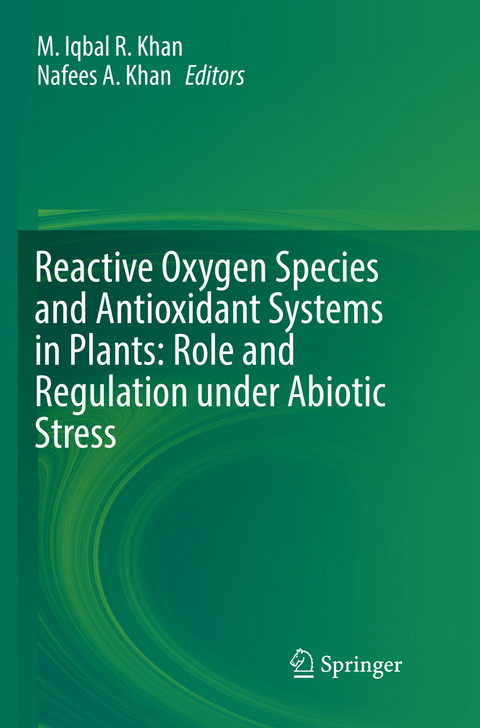
Reactive Oxygen Species and Antioxidant Systems in Plants: Role and Regulation under Abiotic Stress
Springer Verlag, Singapore
978-981-13-5351-2 (ISBN)
The increase in abiotic stress factors has become a major threat to sustainability of crop production. This situation has led to think ways which can help to come out with potential measures; for which it is necessary to understand the influence of abiotic stress factors on crops performance and the mechanisms by which these factorsimpact plants. It has now become evident that abiotic stress impacts negatively on plant growth and development at every stage of plant’s life. Plants adapt to the changing environment with the adjustment at physiological, biochemical and molecular levels. The possible mechanisms involved in the negative effects of abiotic stress factors are excess production of reactive oxygen species (ROS). They alter physiological and molecular mechanisms leading to poor performance of plants. Plants however, are able to cope with these adverse effects by inducing antioxidant systems as the priority. Nevertheless, the dual role of ROS has now been ascertained which provides an evidence for regulation of plant metabolism positively on a concentration-dependent manner. Under conditions of high ROS production, the antioxidant system plays a major role in diminishing the effects of ROS. Thus, ROS production and antioxidant system are interwoven with abiotic stress conditions. The antioxidants have thecapacity to hold the stability in metabolism in order to avoid disruption due to environmental disturbances.
Dr. M. Iqbal R. Khan is a post-doctoral fellow at International Rice Research Institute, Philippines. He completed his BSc, MSc and PhD from Department of Botany, Aligarh Muslim University. His current research interests are elucidation mechanisms involves in flooding tolerance and looking for any additional donor for breeding purpose. He has published over 35 peer-reviewed research articles, contributed 6 book chapters to various book editions published by Springer, CABI etc. He has been awarded by various research fellowships during PhD and post PhD tenure such as, UGC-MANF, DBT-RA, SERB-DST Young scientist, SERB-NPDF and IRRI-PDF. He has been awarded by Young Scientist of the Year Award 2014 from Scientific and Environmental Research Institute, India. Professor Nafees A. Khan is working as plant physiologist at Department of Botany, Aligarh Muslim University, Aligarh, India. The current research interest of Prof. Khan is mainly on understanding the mechanisms of hor monal and nutritional regulation of plant growth with special emphasis on abiotic stress vis-a-vis photosynthetic efficiency and abiotic stress tolerance. He has supervised 15 Ph.D. and 05 M.Phil. students and has edited 14 books, including this, published more than 170 peer-reviewed research articles in journals of international and national repute. He has won various prestigious awards. He is Vice President of the National Environmental Science Academy (NESA), India.
1. An introduction to Antioxidants and Their Roles in Plant Tolerance.- 2. An Introduction to Reactive Oxygen Species Metabolism Under Changing Climate in Plants.- 3. Biotechnological Perspective of Reactive Oxygen Species (ROS) Mediated Stress Tolerance In Plants.- 4. ROS Compartmentalization in Plant Cells under Abiotic Stress Conditions.- 5. Reactive Oxygen Species Production and Detoxification during Leaf Senescence.- 6. ROS-induced Transcription Factors during Oxidative stress in Plants: A Tabulated Review.- 7. ROS-induced Signaling and Gene-expression in Crops Under Salinity Stress.- 8. ROS Signaling in Plants under Heavy Metal Stress.- 9. Effects of Different Metal Stresses on the Antioxidant Defence Systems of Medicinal Plants.- 10. Responses, Adaptation and ROS Metabolism in Plants Exposed to Waterlogging Stress.- 11. Role of Reactive Oxygen Species in Water Deficit Stress Response.- 12. Contribution of Glutathione in Heavy Metal Stress Tolerance in Plants.- 13.Production of Antioxidant and Oxidant Metabolites in Tomato Plants Infected with Verticillium dahliae Under Saline Conditions.
| Erscheinungsdatum | 04.03.2022 |
|---|---|
| Zusatzinfo | 15 Illustrations, color; 5 Illustrations, black and white; XIII, 329 p. 20 illus., 15 illus. in color. |
| Verlagsort | Singapore |
| Sprache | englisch |
| Maße | 155 x 235 mm |
| Themenwelt | Naturwissenschaften ► Biologie ► Botanik |
| Naturwissenschaften ► Biologie ► Zellbiologie | |
| Schlagworte | Crop adaptation • Crop resilience • Salinity stress • Stress tolerance • Sustainable Environment |
| ISBN-10 | 981-13-5351-4 / 9811353514 |
| ISBN-13 | 978-981-13-5351-2 / 9789811353512 |
| Zustand | Neuware |
| Haben Sie eine Frage zum Produkt? |
aus dem Bereich


